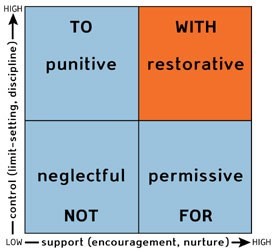What are Restorative Practices?

Restorative practice is a social science that asks us to consider the centrality of relationships in everything we do. The fundamental hypothesis of restorative practices is that “people are happier, more cooperative and productive, and more likely to make positive changes in their behavior when those in positions of authority do things with them, rather than to them or for them.” (www.iirp.edu).
.
The theories of Restorative Practices can be applied in a variety of settings as a means to build strong, healthy, and resilient communities. Consisting of a range of informal to formal techniques, restorative practices stresses the use of proactive methods to build social capital, or relationships, as a means of prevent and minimize conflict and wrongdoing. As meaningful connections amongst individuals are forged, the likelihood of crimes and harm being committed decreases.
That said, eliminating conflict altogether is unrealistic. In cases of wrong-doing, restorative practices utilize formal conferencing techniques to give those harmed and those who have done the harm the chance to participate in a facilitated dialogue about what happened and what needs to be done to make things right. Participation in restorative conferences should always be voluntary and is only appropriate when the person who committed the harm admits to the wrongdoing.
Restorative practices have implications for use in schools, in the home, in the prison system, in the workplace, and any environment where there is a desire to strengthen relationships as a means to prevent harm from being done, and repair a community in the aftermath of harm being experienced.
Safe Futures is pioneering the use of restorative practices in local school districts by incorporating the use of circles into our prevention lessons and offering restorative conferences to administrators as an additional method to managing difficult behaviors. The use of restorative practices in schools has been shown to reduce misbehavior, bullying, violence and crime among students and improve the overall climate for learning, by minimizing suspensions and maximizing classroom learning time.
Testimonials
“I’m going to try to integrate circles into my classroom more often. The change in the atmosphere was dramatic – one minute everyone was talking over each other, but as soon as we got into a circle all the students just listened and shared.” – 8th-grade teacher
“I just shared my heart with you all – we should do this more often.” – 8th-grade student
“Circles make us feel closer to each other, and they’re fun! In circles, we look people in the face when they’re talking. If you look someone in the face it’s harder to be mean to them.” – 6th-grade students
“I appreciate you letting me be a part of the circle yesterday. I do think it was productive and seems to have made an impact/improvement today. The girls were quite perceptive in that a lot of their concerns were around how other people will react and even continue to egg them on (to continue fighting). Thanks again for allowing me to participate. I hope to have the opportunity again.” – Middle school guidance counselor, following a restorative conference
Contact Us
For more information about the impact restorative practices have been having in schools check out: Safer Saner Schools.
To request more information about restorative practices, professional development for your staff, or to request the facilitation of a Restorative Conference with students at your school or organization, contact us at: (860) 447-0366
